The J.H. Whitley Conference
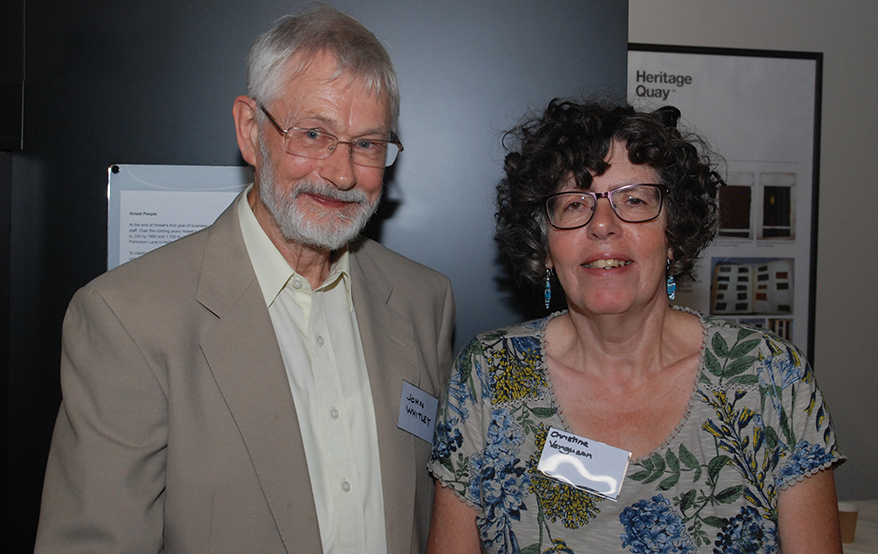 J.H. Whitley's grandson, John Whitley, is pictured with the J.H. Whitley prize-winner the University's Dr Christine Verguson
J.H. Whitley's grandson, John Whitley, is pictured with the J.H. Whitley prize-winner the University's Dr Christine Verguson
Mon, 26 Sep 2016 15:14:00 BST
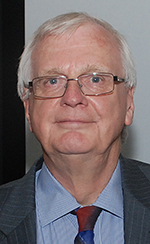 Held at the University on Friday 16 October
Held at the University on Friday 16 October
THE University of Huddersfield is home to an archive of material that documents the life and times of John Henry Whitley, MP for Halifax from 1900-28 and Speaker of the House of Commons from 1921-28. He was also the creator of a conciliatory form of industrial relations – dubbed “Whitley’s” - that played a key role in the public sector for decades.
Every year, the University hosts a J.H. Whitley lecture and the 2016 edition was titled Have Trade Unions a Future?, given by Sir Alistair Graham, former general secretary of the Civil and Public Services Association – for a lecture report see here.
This year the lecture was followed bya University of Huddersfield conference that commemorated the life and times of J.H. Whitley. It was chaired by Professor Paul Ward – Head of the Department of History, English, Languages and Media. Here the historian Dr Neil Pye, author of The Home Office and the Chartists, 1838-1848: Protest and Repression in the West Riding of Yorkshire, gives his account of the event.
Conference summary by Dr Neil Pye
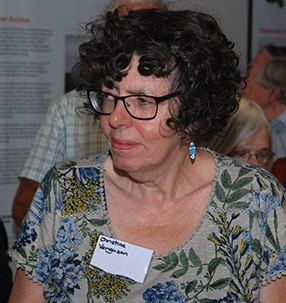 AFTER an opening session that charted the origins of J.H. Whitley’s journey in life, the first presentation was given by Dr John Hargreaves who spoke about how J.H. Whitley’s later role as Speaker of the House of Commons was shaped by his roots in Halifax, where he worked at his uncle’s cotton spinning business. This was followed by C.S. Knighton’s talk which examined J.H. Whitley in the context of the Clifton Liberal tradition. In his early life, Whitley attended Clifton College, Bristol, where it was said that his views became ‘softened and civilised’.
AFTER an opening session that charted the origins of J.H. Whitley’s journey in life, the first presentation was given by Dr John Hargreaves who spoke about how J.H. Whitley’s later role as Speaker of the House of Commons was shaped by his roots in Halifax, where he worked at his uncle’s cotton spinning business. This was followed by C.S. Knighton’s talk which examined J.H. Whitley in the context of the Clifton Liberal tradition. In his early life, Whitley attended Clifton College, Bristol, where it was said that his views became ‘softened and civilised’.
Clyde Binfield’s lecture J.H. Whitley: A Model for Free Churchmen looked at Whitley’s political career as the Member of Parliament for Halifax from 1900-28. During that time, he spent ten years as Deputy Speaker and eight years as Speaker of the House of Commons. Binfield’s lecture treated those present to an excellent study of the Whitley family tree, for which the inter-connecting relationships cut across various areas of political and public life. He said that “Whitley Councils were more notable for their potential than their achievements”, and like his speakership, were ‘rooted and organised’ similarly to Whitley’s Congregationalist beliefs.
The second part of the conference had a focus on J.H. Whitley’s role in broadcasting. In doing so, Dr Christine Verguson (pictured right) from the University of Huddersfield – winner of the J.H. Whitley prize for research – lectured on J.H. Whitley and the BBC. She charted the BBC’s experiment with local radio during the 1920s and 1930s, especially in Huddersfield, Leeds, Bradford and Sheffield, where relay stations were set up.
From 1930-35, J.H. Whitley was Chairman of the Board of Governors at the BBC, where he oversaw many of these changes. In 1932, when the BBC’s Empire Service was created, now aptly known as BBC World Service, Whitley’s voice was the first to be heard when the service opened. Also, his son Oliver later went on to become head of the BBC’s World Service.
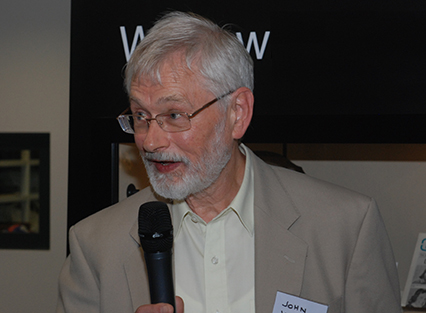 John Whitley (pictured left) – J.H. Whitley’s grandson – spoke on his grandfather’s appointment as Chairman at the Board of Governors at the BBC. Prior to Whitley’s appointment at the BBC in 1930, Lord John Reith, who served as Director-General from 1927, previously had a fraught relationship with J.H. Whitley’s predecessor, the Earl of Clarendon, who was the BBC’s first-ever chairman. Whitley took on the role of Chairman of the BBC after retiring as Speaker of the House of Commons in 1928, on the grounds of ill health. In this role, he was noted for his ‘excellent wisdom and immense enthusiasm’, which shaped an excellent working relationship with Lord Reith.
John Whitley (pictured left) – J.H. Whitley’s grandson – spoke on his grandfather’s appointment as Chairman at the Board of Governors at the BBC. Prior to Whitley’s appointment at the BBC in 1930, Lord John Reith, who served as Director-General from 1927, previously had a fraught relationship with J.H. Whitley’s predecessor, the Earl of Clarendon, who was the BBC’s first-ever chairman. Whitley took on the role of Chairman of the BBC after retiring as Speaker of the House of Commons in 1928, on the grounds of ill health. In this role, he was noted for his ‘excellent wisdom and immense enthusiasm’, which shaped an excellent working relationship with Lord Reith.
The debate returned to Whitley’s early political life. The University of Huddersfield’s Professor Keith Laybourn gave a paper titled J.H. Whitley and Halifax politics, 1890-1900: The politics of social reform. It discussed why Whitley was successful as a Liberal Party politician at a time when the Labour Party was growing, for which Halifax, next to Bradford, was the second most important centre for the emergence of the Independent Labour Party.
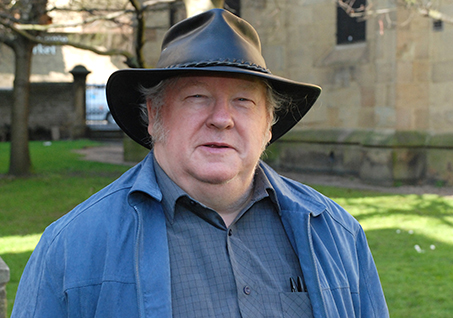 Professor Laybourn (pictured right) began his lecture by outlining some themes, insofar as J.H. Whitley through his local business interests and non-conformist views reflected the characteristics of New Liberalism, which emerged under David Lloyd George during the period. It was his views of citizenship; social harmony and aspiration, which enabled Whitley to strike a chord with the Halifax community and forge a relationship with the ILP that helped cement his position as the Member of Parliament for Halifax.
Professor Laybourn (pictured right) began his lecture by outlining some themes, insofar as J.H. Whitley through his local business interests and non-conformist views reflected the characteristics of New Liberalism, which emerged under David Lloyd George during the period. It was his views of citizenship; social harmony and aspiration, which enabled Whitley to strike a chord with the Halifax community and forge a relationship with the ILP that helped cement his position as the Member of Parliament for Halifax.
Professor Greg Patmore, of the University of Sydney, spoke on Industrial Relations and Joint Industrial Councils: the UK and beyond, comparing and contrasting Whitley Councils in the UK with German Works Councils during the early twentieth century. “Whitleyism” was not confined to the UK public sector, but also had appeal in Australia and Canada through the railway unions. This paper also provided an excellent insight into both the efficiency and anomalies of Whitley Councils in managing worker/employer relations, as well as the mechanics of how those councils operated.
 Professor Richard Toye (pictured left) of Exeter University – who gave the first J.H. Whitley lecture in 2012 – examined Whitley’s role as Speaker. The focus of this fine presentation was the context of Whitley’s speakership and the importance of Parliament during an era of great political upheaval and instability.
Professor Richard Toye (pictured left) of Exeter University – who gave the first J.H. Whitley lecture in 2012 – examined Whitley’s role as Speaker. The focus of this fine presentation was the context of Whitley’s speakership and the importance of Parliament during an era of great political upheaval and instability.
When he became Speaker in 1921, the Conservatives and Unionists were highly suspicious of Whitley’s appointment, mainly because of an incident in 1913, where as Deputy Speaker, he was accused of not playing by the rules in allowing a Liberal speaker to stray during a debate, without giving order.
Toye’s lecture examined how J.H. Whitley as Speaker of the House, handled David Lloyd George’s Liberal Government, which was said to have had a reputation for high-handedness in Parliament, as well as the “rowdyism” associated with Labour MPs in 1922. In his role as chair, Whitley successfully restored order, for which Toye said that his gentleness and persuasiveness ruled and often subdued opponents. He also asserted that J.H. Whitley’s brand of Liberalism was largely based on “rational consideration” that coalitions were good. For that reason, Toye said that Whitley’s success as Speaker of the House and Halifax MP represented the strange survival of Liberal England that transcended its division and gradual demise as a major political force throughout the twentieth century.
In a presentation titled J.H. Whitley and the British Empire, Professor Paul Ward, with Amy Stoddart, a third-year undergraduate, and history graduate, Amerdeep Panesar – who is about to begin a PhD – plus Sarah Wells and James Turner, examined sources relating to J.H. Whitley’s chairing of the Royal Commission of India. Whitley was appointed to the role on the basis of his vast experience in labour relations and good knowledge of imperial matters.
 This very good team presentation drew on information taken from a series of workshops about J.H. Whitley, as well as a broad study of his archives at Heritage Quay, which were donated by John Whitley to the University of Huddersfield five years ago, to encourage scholarly research. Professor Ward (pictured right) made a very good point when he asserted that the Liberals embraced the notion of Empire and Imperialism just as much as their Tory counterparts.
This very good team presentation drew on information taken from a series of workshops about J.H. Whitley, as well as a broad study of his archives at Heritage Quay, which were donated by John Whitley to the University of Huddersfield five years ago, to encourage scholarly research. Professor Ward (pictured right) made a very good point when he asserted that the Liberals embraced the notion of Empire and Imperialism just as much as their Tory counterparts.
All three speakers gave excellent talks which charted Whitley’s work for the Royal Commission, which included two tours during 1929-30, and official meetings held in London and Delhi. From this, we are given an insight into J.H. Whitley’s humanitarian side, for which he felt saddened by working and living conditions he witnessed in India. This gave rise to a number of recommendations made by the commission which included better workplace conditions, basic health and safety rules, as well as improvements made to women’s rights and child labour conditions. All of the proposals were put forward at a time of huge social, economic and political instability caused by the Great Depression during the late-1920s and early-1930s. They not only contributed to the immediate political stability in India, but also helped improve labour unrest, which largely came about as a result of Whitley’s agility and impartiality as chairperson.
The final presentation was delivered by Professor Keith Robbins, former Vice-Chancellor of the University of Wales. It was titled, Home Rule All Round: Mirage or Solution? and examined how J.H. Whitley’s political career which centred on Halifax, translated itself at Westminster. The question-and-answer session afterwards threw up some puzzling conundrums about Whitley’s views about international politics.
For example, Professor Robbins noted that in the sources, there is very little about World War One. Also, hardly anything is known about J.H. Whitley’s thought on the the Germany Question. Whilst Whitley’s views about Armenia and Boer War are fairly well-documented, Professor Robbins said there is very little that Whitley, even when Speaker of the House of Commons, “engaged with hard-nosed political issues”, for which the centre of his political world was clearly rooted in Halifax.
All credit must go to the organisers and everyone involved who contributed towards putting on a first-class conference, which ended with more questions than resolutions being raised about the life and times of J.H. Whitley.







